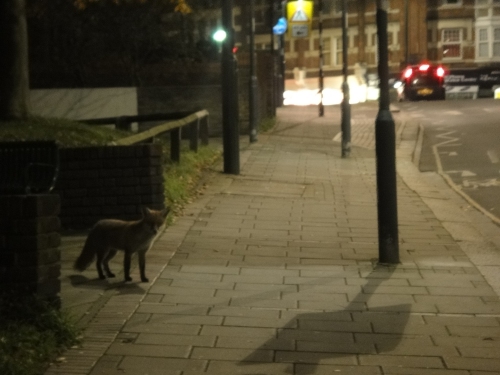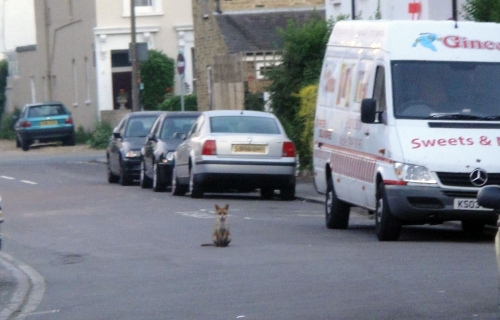Foxes on the prowl
 To most people living in the suburbs, foxes are a rare sight and the only real problem caused by them is noise disturbance at late nights in winter and summer – these are either mating calls or territorial disputes or cubs battling it out to be top dog (or fox!).
To most people living in the suburbs, foxes are a rare sight and the only real problem caused by them is noise disturbance at late nights in winter and summer – these are either mating calls or territorial disputes or cubs battling it out to be top dog (or fox!).
Richmond Borough has available information on foxes – unlike rats and mice, there is no statutory duty to deal with foxes – they are not vermin and art part of our urban wildlife. Residents are given advice and encouraged to adopt humane solutions and deterrence to any fox problems they have.

Although the Council’s own advice leaflet states that humans and large pets are rarely at risk from foxes, residents cats have been attacked recently by one particularly audacious pack of three foxes that inhabit areas near Elleray Hall and the depot building in the smaller car park at the back of Tesco.
Cats and birds (mostly pigeons) have been killed in attacks where the pack have been cornering their victims (sometimes in daylight) and have been seen running off with the bodies. A solution to this particular problem is being looked at but in the meantime nearby residents might want to keep a closer eye on their pets – also smaller ones such as rabbits and guinea pigs that are kept in gardens.

Foxes are being seen in greater numbers and more unusual & busy locations in Teddington lately – due to larger breeding numbers and going further-afield to look for food.
Foxes usually stick to scavenging from rubbish bins and bags – if foxes are causing issues in your area then keeping rubbish out of their reach where possible is the best way to keep them away from your property. Try to leave bins out no earlier than the night before collection and if needed before this, use bins with lids.



You should live around Cambridge Road, Cherrywood Court, Westminster Close we have families breeding there, they come and go all day, the mess is disgusting. We have done everything within our power to deter the foxes but to no avail. We have spent fortunes on putting down animal friendly spray as suggested on all the fox protection websites but this didn’t deter them. They just live here and you watch them all day killing birds, harrassing cats and my rabbit lives in fear hourly, so much so he is in the house most of the time now. Ridiculous. The council will do nothing about them. I am not into culling but castration and relocation is my idea.
Hi Amanda, i can forsee problems with your own particular method.. i’m licensed by Surrey Police to dispatch foxes humanely.
Martin
Sorry to hear that Amanda – foxes seem to be caught between being a pest but not considered vermin. If a domestic animal were causing this much havoc then the owners would be responsible and something would have to be done.
If anyone has a problem with urban foxes please contact these people rather than traditional inhumane pest control as they will find solutions that respect both humans and wildlife.
http://www.foxproject.org.uk/
They didn’t when I contacted them in fact I never heard a word from them.
Foxes are very easily deterred from affected gardens and from particular behaviour by simple application of non-toxic repellents – see The Fox Project’s website http://www.foxproject.org.uk
Despite urban myth, the fox population is not growing. It has simply become more visible as it learns how little of a threat humans pose and, in most cases, how tolerant of them most people are. In fact, scientific surveys confirm the fox population in the southeast may be as much as 10% lower than it was in 1998.
The Red Fox is a self-regulating species and, conversely, the only thing that drives the population higher is culling or removal and relocating (technically illegal). How so? Isn’t that a contradiction? No. What killing and relocation does is to undermine natural hierarchies, under which only the dominant foxes may normally breed. Wreck that hierarchy, remove those controls, and a larger number of vixens may breed. Foxhunters – who wouldn’t want fox numbers reduced, for fear of losing their quarry – rely on the over-population that results from hunting and killing this year to ensure there are plenty of foxes for next year’s ‘sport’. Left alone, foxes simply breed back to replace numbers lost naturally each year, and never more. After all, why create more competition for food and territorial resources?
Whatever urban myths may abound about foxes taking cats – my own 17 year old cat sees the foxes out of the garden on a daily basis – foxes do not hunt in ‘packs’. Unlike dogs, wolves etc., they are lone hunters and have no understanding of co-operation.
One of your correspondents suggests castration. Not much point when most foxes don’t live long enough to breed and only 15% of vixens breed in any one year. And would council tax payers support a rise in rates to pay for it?
Of course, another option might be to employ a private ‘pest controller’. A nice little self-perpetuating job, this. Most will charge you hundreds of pounds to trap and kill a fox but they won’t tell you another will take over the vacant territory within three weeks at most.
You don’t have to live with foxes on your doorstep. You can defend your own patch quite easily with mild repellents. But don’t expect never to see a fox again. As much as they may be living on your territory, you’re living on theirs.
I did and it didn’t work they had another family in fact they are calling at the moment. I saw the male when I was driving in on Wednesday night they are not scared or deterred by anything. I put the deterrent down over 5 times now and absolutely nothing stops them. They are a problem when they continually mess on your door step and back door step the smell is putrid and you can’t get to sleep because of the noise.
I am an animal lover I have two dogs and a rabbit, I’m keen on keeping the streets clean on dog mess and originate in the country. I have never seen a fox prowling the countryside nor have I ever heard one yet I regularly get worken up at night my the sounds of them calling or mating. I have called all the fox society’s for help with deterrents heard nothing. I am not into killing any animals but there must be a solution. I regularly see the fox with dead things in its mouth, birds, rabbits feeding the family, I regularly hear the little furries screaming as they are being caught. I use Jeyes fluid daily to keep them from scenting. They have attacked two dogs and three cats in my radius and I really think something humane and non-lethal should be done. Not sure why relocation isn’t a good idea, other than that castration or immunisation would surely be a good solution. As I have said before I am not into culling hate the fact they do it to the deer.
The recognised world authority on foxes is Bristol University’s Mammal Group which has been conducting a continuous study for for decades. I recommend their website http://www.thefoxwebsite.org This totally unbiased site provides answers to any question anyone can think of regarding foxes.
I have been operating a wildlife deterrence service an London and the south east for 12 years. I have never found it necessary to use lethal methods in any situation. There is always a humane alternative.
On foxes, the government (Defra) policy follows the same line, that killing or removing foxes leaves a vacant territory which is rapidly filled by other foxes. Defra says, “The most effective strageies to resolve fox problems have primrailty relied on non-lethal methods, focusing on preventative and deterrent strategies.”
In London a fox destruction strategy was conducted in London at great cost to tax-payers, from 1940 into the 1980s when it was abandoned because there more foxes at the end than when the killing started.
Hello
Sorry to stick a Hampton oar in but I would strongly recommend the motion activated water scarecrows you can buy. We had a real problem with foxes fouling in our garden, making it pretty much a no go area for our small children.
We tried the scented gel, the electronic sub-sonic deterrent, wire across holes dug under the fence and nothing worked.
We installed the water scarecrow and the problem ceased almost instantly. They’re not cheap. Ours was about £70 as I recall but it pays for itself in the long run
I recently moved out of Cambridge Road near Westminster Close. I agree with Amanda about the seemingly larger population around there. I bumped into them on numerous occasions, and they appeared to get cockier as time went by. Everyq where from Station Road, down Elmfield Ave, and especially near Cherrywood Court. I did find, however, that they still scare relatively easily. A good clap of the hands and a stern “oi” gets their attention and they flee. Other than I can’t offer many suggestions.
http://urbanwildlifemanagement.co.uk/